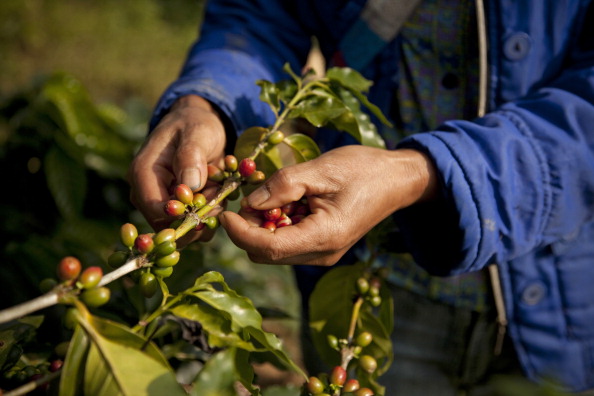High quality coffee exports from China are set to receive a boost as Volcafe, a leading international coffee trader, launches a procurement and processing joint venture in the southern province of Yunnan.Arabica coffee production from Yunnan has been growing steadily over the past decade, and its quality has improved to the levels equivalent to Central American beans, say traders.Switzerland-based Volcafe, which is part of commodities trader ED & F Man, has been exporting Chinese arabica coffee, used in high quality blends, for the past 10 years, and it will become the first international trader to have a local presence through its joint venturewith Simao Arabicasm Coffee Company, a Yunnan coffee company.
知名跨國咖啡交易商Volcafe在云南設(shè)立了一家從事采購和加工的合資公司,此舉有望提振中國高品質(zhì)咖啡豆的出口。過去10年里,云南阿拉比卡咖啡豆(arabica,亦稱小粒咖啡)的產(chǎn)量一直在穩(wěn)步增長。交易商表示,其品質(zhì)已提升至與中美洲咖啡豆相當(dāng)?shù)乃健?/span>總部位于瑞士的Volcafe隸屬于大宗商品交易商ED&F Man。過去10年,Volcafe一直在出口中國產(chǎn)阿拉比卡咖啡豆,將其用作高品質(zhì)咖啡的混合原料。通過與云南思茅阿拉比卡星咖啡公司(Simao Arabicasm Coffee Company)組建合資公司,Volcafe將成為首家在中國擁有據(jù)點的國際咖啡交易商。
“Chinese mild arabica is still relatively new to the world coffee scene, but its improving consistency means it is rapidly growing in acceptance with global roasters,” said Jan Kees van der Wild, global head of commodities at ED & F Man.Nestlé has been involved in the Chinese coffee farming industry since the late 1980s, investing in the sector alongside the Chinese government and the United Nations Development Programme.Since then, Starbucks opened a processing mill and a farmer support centre, providing technical assistance to farmers.Coffee was first planted in Yunnan, more famous for its tea, in the late 19th century by European missionaries. However, coffee drinking in China has tended to centre around instant coffee made from lower quality robusta beans.
ED&F Man大宗商品全球主管揚•基斯•范德維爾德(Jan Kees van der Wild)表示:“中國味道清淡的阿拉比卡咖啡豆在全球咖啡市場仍屬于相對新鮮的品種,但其質(zhì)量穩(wěn)定性不斷改善,讓它正迅速得到全球烘培商的認可。”自上世紀80年代末起,雀巢(Nestlé)就涉足中國咖啡種植業(yè),與中國政府和聯(lián)合國開發(fā)計劃署(United Nations Development Programme)一起投資于該行業(yè)。在那之后,星巴克(Starbucks)在中國設(shè)立了一家加工廠和一個農(nóng)戶支持中心,向農(nóng)戶提供技術(shù)援助。云南產(chǎn)的頭一批咖啡(與咖啡相比,云南的茶葉更為知名)是由歐洲傳教士在19世紀末種植的。不過,中國人目前喝的更多是速溶咖啡,這類咖啡通常以品質(zhì)較低的羅布斯塔(robusta)咖啡豆制成。China produces more than 1m 60kg bags of arabica coffee – almost as much as Costa Rica and about a 10th of Colombia’s output – and most of it is exported.Mark Furniss, Volcafe’s business development director for Asia, said European roasters have been buyers of Yunnan coffee, especially at times of dips in Central American production.The recent fall in Colombian output due to leaf rust disease spurred imports of Chinese coffee. “It has become a regular component of the roasters’ blends,” he said.
中國阿拉比卡咖啡豆的產(chǎn)量超過100萬袋(每袋60公斤),幾乎與哥斯達黎加一樣多,是哥倫比亞產(chǎn)量的十分之一左右,多數(shù)用于出口。Volcafe亞洲業(yè)務(wù)拓展總監(jiān)馬克•弗尼斯(Mark Furniss)表示,歐洲烘培商一直是云南咖啡豆的買家,特別是在中美洲產(chǎn)量下滑之際。哥倫比亞的咖啡豆產(chǎn)量最近因葉銹病下滑,這刺激了中國咖啡豆的出口。他表示:“(中國咖啡豆)已成為烘培商混合所用的常規(guī)組分。”這些需求導(dǎo)致中國咖啡豆的價格在過去幾年里呈現(xiàn)上漲趨勢。咖啡交易商稱,中國咖啡豆現(xiàn)在的售價較紐約阿拉比卡咖啡豆基準價格存在一位數(shù)的折讓,目前為每磅1.95美元。











